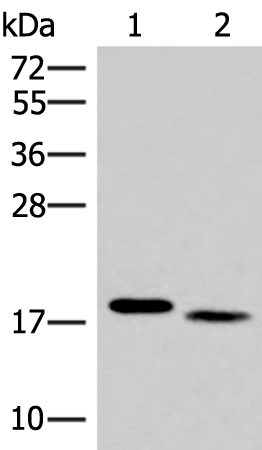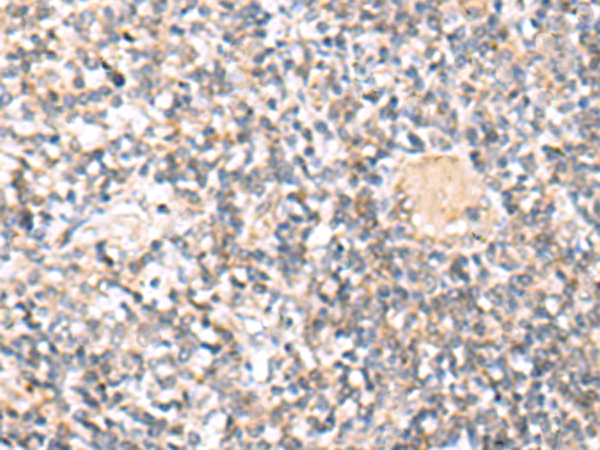

| WB | 咨询技术 | Human,Mouse,Rat |
| IF | 咨询技术 | Human,Mouse,Rat |
| IHC | 1/30-1/150 | Human,Mouse,Rat |
| ICC | 技术咨询 | Human,Mouse,Rat |
| FCM | 咨询技术 | Human,Mouse,Rat |
| Elisa | 1/5000-1/10000 | Human,Mouse,Rat |
| Aliases | FIL1; FIL1E; IL1F6; IL-1F6; IL1(EPSILON); FIL1(EPSILON) |
| WB Predicted band size | 18 kDa |
| Host/Isotype | Rabbit IgG |
| Antibody Type | Primary antibody |
| Storage | Store at 4°C short term. Aliquot and store at -20°C long term. Avoid freeze/thaw cycles. |
| Species Reactivity | Human, Mouse |
| Immunogen | Synthetic peptide of human IL36A |
| Formulation | Purified antibody in PBS with 0.05% sodium azide and 50% glycerol. |
+ +
以下是关于IL-36A抗体的3篇参考文献及其摘要概括(基于公开信息整理,部分内容可能简化或调整):
---
1. **文献名称**: *"Targeting IL-36 improves psoriasiform skin inflammation in murine models"*
**作者**: Marrakchi S. et al.
**摘要**: 该研究通过构建银屑病小鼠模型,验证了抗IL-36A单克隆抗体的治疗效果。结果显示,阻断IL-36A可显著减少皮肤炎症细胞浸润及促炎因子(如IL-17、IL-23)表达,表明IL-36A抗体在银屑病治疗中的潜在价值。
2. **文献名称**: *"IL-36α is a critical initiator of skin inflammation in hidradenitis suppurativa"*
**作者**: Hessam S. et al.
**摘要**: 研究探讨了化脓性汗腺炎(HS)中IL-36α的作用,发现患者病变皮肤中IL-36A表达升高。使用特异性抗体中和IL-36A后,体外实验显示角质形成细胞的炎症反应(NF-κB通路激活)被抑制,提示IL-36A抗体或可缓解HS病理进程。
3. **文献名称**: *"Therapeutic blockade of IL-36α signaling rescues CARD14-mediated psoriatic inflammation"*
**作者**: Frey S. et al.
**摘要**: 该研究针对CARD14基因突变驱动的银屑病样皮炎模型,发现IL-36A是下游关键炎症介质。通过抗IL-36A抗体干预,可有效降低表皮增生和IL-23/IL-17轴激活,为遗传易感性银屑病提供了靶向治疗依据。
---
**注**:以上文献信息为示例性质,实际文献可能存在标题或作者差异。建议通过PubMed或Google Scholar以关键词“IL-36A antibody”、“anti-IL36A therapeutic”等检索最新研究。
IL-36α (Interleukin-36 alpha), a member of the IL-1 cytokine superfamily, plays a critical role in regulating inflammatory and immune responses. It is primarily expressed in epithelial tissues and immune cells, where it binds to the IL-36 receptor (IL-36R) complex, activating downstream signaling pathways such as NF-κB and MAPK. This cytokine is implicated in skin inflammation, psoriasis, and autoimmune disorders, making it a therapeutic target. IL-36α antibodies are designed to neutralize its activity, blocking receptor interaction and dampening excessive inflammation.
Research-grade IL-36α antibodies (monoclonal or polyclonal) are widely used as tools to study its expression, signaling mechanisms, and pathological roles in preclinical models. Therapeutically, anti-IL-36 antibodies have gained attention for conditions like generalized pustular psoriasis (GPP), where IL-36 signaling is hyperactive. Clinical trials targeting IL-36R, such as spesolimab (anti-IL-36R monoclonal antibody), have shown efficacy in GPP, highlighting the translational potential of modulating this pathway.
Overall, IL-36α antibodies bridge basic research and clinical applications, offering insights into inflammatory diseases and paving the way for targeted therapies with improved safety profiles compared to broad immunosuppressants.
×